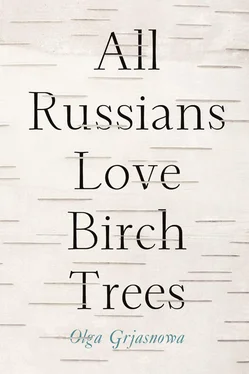It was sunny, hot, and humid. The moment I stepped onto the street, sweat was trailing down my skin. I sat, freezing, under the A/C unit, working on a translation that turned out to be more difficult than I’d expected. It was a sociological paper, studded with footnotes and bold technical terms. But since it was Friday and the office was almost empty, I took generous breaks. I couldn’t concentrate, I looked out the window and forced myself to plan something for the evening, even though I wasn’t in the mood for much of anything. I could go out with Tal — she might even agree to that — but then I would have to shower, shave, get dressed, and put on makeup. Afterward I’d be stuck waiting for her on my deck, since I’d be done way too early. She would cancel on me last minute and I would have to ask myself some existential questions. All in all, it could turn into a nice Shabbat that would stretch into desperation late at night, leaving me with no choice but to numb it with alcohol.
I made myself a coffee in the kitchen. Mushy sandwiches from an unknown benefactor were spread out on the table. I decided to buy burekas . On my way I saw a man slowly strolling down the street, pushing his bike. He had hardly changed. Our clothes touched in passing and I followed him. He went down the street, turned into an alley, then into another one, until we were back on King George Street. The sidewalk was crowded and I had to give way to people again and again. It was as if they’d united into a single collective body that was in my way. At the crossing with Bograshov Street he locked his bike in front of a small shop. I followed him inside. On the rails hung Goa hippie clothes in even brighter colors than usual. My throat was dry. I wanted to drink something, but didn’t have my water bottle. A pair of pants over his arm, he stood next to the dressing room, looking at me questioningly. He, too, wore things that didn’t match. But it wasn’t Elisha. The shop assistant asked whether she could help me, her tone and volume bordering on hysterical. Colors and sounds mixed, as if a fuse had just popped in my head. I began shivering and sweating and ran outside, across the street, toward the sea. At some point, I collided with a corpulent woman. From her shopping bag tomatoes spilled out across the pavement. Overly red and overly meaty. A soldier with dimples and an Uzi asked me if I was OK. His voice beating my eardrum. I shivered and ran on. Everything was unbearably loud and vivid. I leaned against a wall for support, felt a hand on my shoulder, screamed, shook it off and ran a few steps. Toward the sea. When the panic subsided a little I fell into the sand. The sea was calm. I closed my eyes and tried to reconstruct Elias’s face, but the image remained blurry. Were his lashes brown or black? And how much did his right ear stick out? The shivering intensified. I sweat and shivered and sweat. Taking a seat in a cafe, I ordered a glass of cold milk.
I breathed deeply, watching the people pass by. When they ceased to seem threatening, I went to the bathroom and washed off the sweat. I sat back down, called work, and told them I’d twisted my ankle. Then I ordered another glass of milk. I saw him, him, and only him. Then somebody waved at me from across the street and yelled my name. It wasn’t a hallucination this time. It was Daniel, the Judeophile, who came toward me, smiling, with a sunburned nose and a gigantic backpack.
“I knew you’d end up here sooner or later,” he said, throwing his backpack onto the chair next to mine. He hadn’t changed much, except that his skin was lobster-red from all the sun and he’d gotten a little chubbier.
“I just got here from Lebanon. Wanted to get a better idea of the situation there. You were kind of right. It’s not OK what Israel does there. It would be a nice gesture to give back the Occupied Territories — especially now.”
“It would have been a nice gesture in 1967 as well. Or last Thursday. This is not about nice gestures. Have you lost your mind?”
My heart rate was back to normal again and the light had changed with the setting sun.
“But especially now! Just think about it!” he said euphorically.
I interrupted him. “What do you mean, anyway? A nice gesture? Not to annihilate the Jews would have been a nice gesture as well. And since when do you care about Palestine?”
“I taught in a refugee camp there. The kids really liked me. And you know, sometimes we talked about the conflict.”
“And what did you tell them?”
“Come on. They were the ones doing the talking. How horrible it all had been. With Israel. All this injustice and wars. I had no idea. You always brushed me off. They told me they hate the Jews. They wish they’d die. But I corrected them. Told them it’s wrong to hate the Jews. You can’t tar them all with the same brush. They were kids, after all. Six- and seven-year-olds. I told them it’s not the Jews who are to blame. But they can go ahead and hate the Israelis.”
I had lost all control. Even over my own body. I left Daniel sitting by himself at the table, went home, and poured a glass of vodka. As soon as the alcohol started to warm me from the inside, I took a shower and let the cold water wash the heat off my skin. Then I wrapped myself in a towel and drank another glass. Then I reached for the telephone, dialing slowly, as if for the first time, and when I heard Cem on the other end, I cried and hung up. He called back.
“I dialed the wrong number.”
“That’s a lie,” Cem answered calmly. “How are you?”
I took the phone with me out onto the deck. It was dark already. Mosquitos swarmed in the cones of light around the streetlamps. A cockroach sat on the rail. I removed my shoe, took aim, squished the cockroach, and brushed its body off the rail with my shoe. I started to cry again. The tears came from my core, from my stomach and intestines, and I couldn’t stop and I cried and cried. A choppy, staccato wail that took my breath away. My hands started shivering again. I was anxious. But this time I heard Cem’s breath on the other end of the line, at the other end of the world, and after a while my breathing calmed again. It was only now that Cem spoke: “Masha, I’ll be there soon.”
Cem really came. The sweetheart. My consoler. I’d asked him on the phone what he wanted to see and he said it would be enough to take a trip to Jerusalem. And besides, he was coming to check on me, not to climb the Mount of Olives and await Judgment Day.
In the end, we didn’t go anywhere. Just lay next to each other on the beach, making sure that the other one didn’t get sunburned. We swam, but the water wasn’t cooling and we enjoyed the shower at the beach more than we did the sea itself. In front of us a white, Russian-speaking grandmother played with her dark-skinned grandson.
“Things are not going to be easy for him,” said Cem, pointing at the boy.
“Why not?”
Cem looked at me, tauntingly. “Soon he’ll realize that he’s different from them. He still thinks they’re all the same. But not too long from now he’ll notice that he’s black.”
“When did you start feeling different?”
“In elementary school. Fourth grade. Shortly before they decided who would be going on the college track and who wouldn’t. A new boy came into our class. Pierre-Marie. The teachers were beside themselves. The boy hardly knew any German but everyone thought of him as extremely intellectual, because he was French and because they thought his German would be perfect in a week. And then I looked around at my class. Full of kanacks . Marcel spoke Italian, Georgi Greek, Taifun Turkish, Ali Persian and Armenian, just like his twin sister. And all of us spoke German, too. Without an accent. And yet none of us was considered intelligent enough to go on the college track. We were destined for remedial school, or — at best — trade school. Our parents weren’t supportive enough, they said. I thought of my grandfather, who had always told me and my brother, Turkish is the language of the ancestors, Arabic the language of prayer, and Persian the language of love. Such bullshit. I think that’s when I decided to learn the languages the Germans admired so much, and speak them better than they ever would. To have the last laugh. About them and their cultural hegemony.”
Читать дальше












